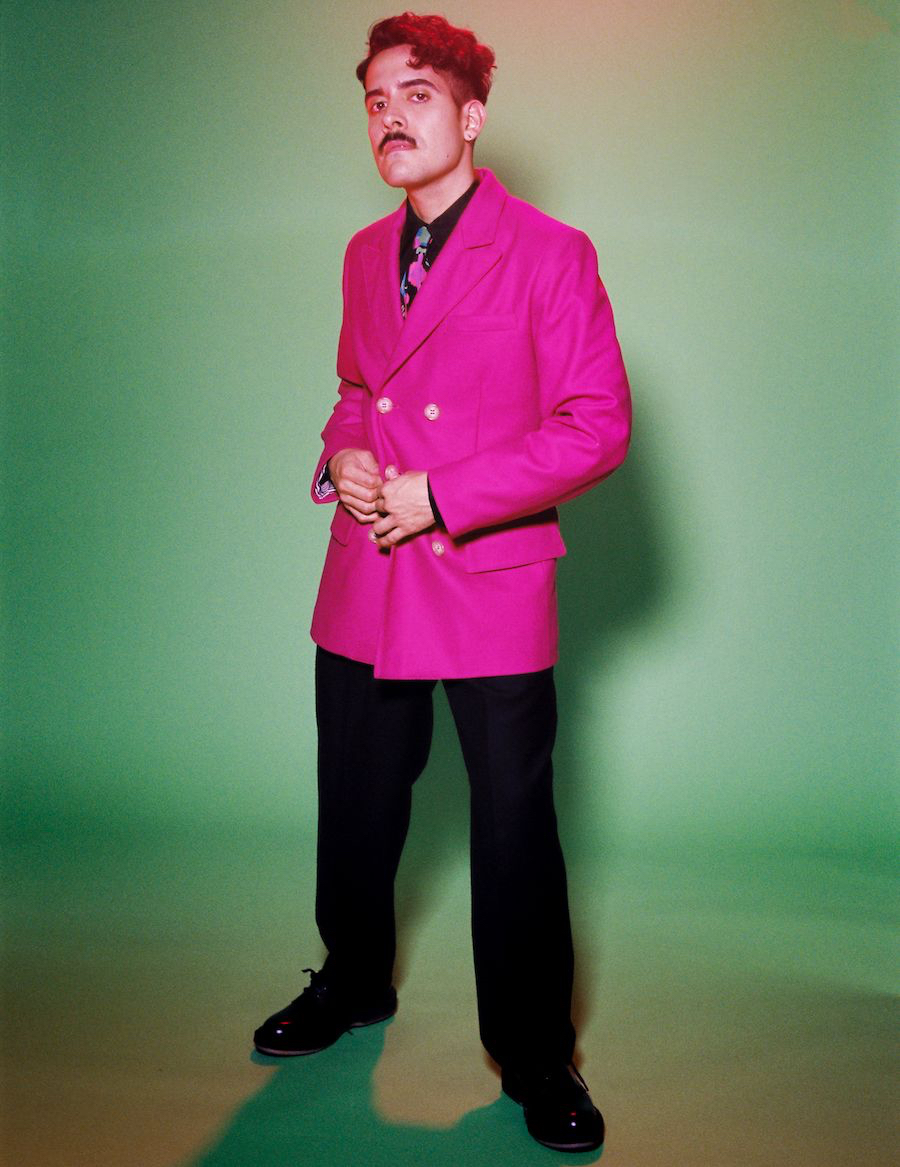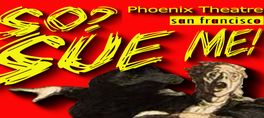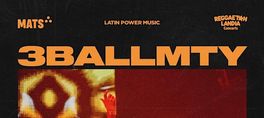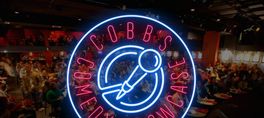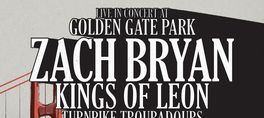The plan was simple: a new album for Alan Palomo's long-running project Neon Indian, the fourth installment of an unhurriedly growing body of work stretching back to 2009's Psychic Chasms, this time with a swerve into vintage Peruvian cumbia and a political album concept. But the self-imposed creative prompt turned out to be more of a muzzle, and the work stalled. Logistical problems set in. Then the pandemic happened. Deadlines came and went, the creative thread got dropped, and the project went terminally adrift.
Palomo also found himself similarly floating through the ambiguous psychic space of quarantine, where time, space, and the meaning of concepts like "deadline" and "career trajectory" start to shed their certainty. His attempts to find steady ground went wrong in almost slapstick fashion--when he invested in a professional home studio upgrade only to have a construction crew move in next door, followed by a particularly noisy nightingale that took up residence outside his window. It started to feel like he was a protagonist in a Pynchon novel who finds their certain-seeming life suddenly rebooted as comedy for the entertainment of mysterious unknown parties.
Like Oedipa Maas and Larry "Doc" Sportello before him, Palomo got through the experience by giving himself over to the flow. He let go of the album concept, followed by the Neon Indian name. ("I said what I'd wanted to say with that project.") He bought a piano and started learning to play it properly for the first time. Soon the creative current picked up and started pulling him in an unexpected but fruitful direction, back to the sophisti-pop of Prefab Sprout, the Blue Nile, and Bryan Ferry that form some of his deepest core musical influences. Borrowing a quote from Inherent Vice that aptly described its creative process, Palomo named the resulting work World of Hassle.
From the intricate fictional details packed into the cover art (co-created by Palomo and designer Robert Beatty, who also did the Japanese-import-inspired cover for 2015's Vega Intl. Night School) to the lyrical collage of pop culture and political references to the music's early-digital sheen, World of Hassle is a vivid piece of world-building that takes listeners into a slightly surreal pocket dimension saturated with anxiety and nostalgia, where jazz-funk and wide-shouldered Claude Montana suits never went out of style, and the Cold War chill that suffused Leonard Cohen's 1988's I'm Your Man never lifted.
Palomo's World of Hassle is a Pynchonesque place, packed with characters and situations rendered in dreamily absurdist strokes--guerilla freedom fighters camped out in a Rainforest Cafe in "The Wailing Mall," a crumbling ex-pop star in "The Return of Mickey Milan," the Leisure Suit Larry-does-Ibiza fantasy of "Nudista Mundial '89" (featuring Mac DeMarco, who hosted some of the album's sessions in his home studio). There's a free-floating air of anxiety, compounded by a crisply digitized sonic palette borrowed from the 80s golden age of rock stars like Bryan Ferry and Sting leaving their own breakthrough projects to strike out as jazzy solo musicians.
It's parody, sure--of rock star ego trips, the mall-ification of America, and our own self-obsession, even on the brink of apocalypse--but it's also dead serious, the sound of history repeating itself as the Doomsday Clock clicks past its Reagan-era maximum and nuclear anxiety comes back into style along with digital synthesizers and sax solos. The deeper it pulls you into its own uncanny reality, the clearer it becomes how thin the borders are between Alan Palomo's World of Hassle and our own.
show less
Palomo also found himself similarly floating through the ambiguous psychic space of quarantine, where time, space, and the meaning of concepts like "deadline" and "career trajectory" start to shed their certainty. His attempts to find steady ground went wrong in almost slapstick fashion--when he invested in a professional home studio upgrade only to have a construction crew move in next door, followed by a particularly noisy nightingale that took up residence outside his window. It started to feel like he was a protagonist in a Pynchon novel who finds their certain-seeming life suddenly rebooted as comedy for the entertainment of mysterious unknown parties.
Like Oedipa Maas and Larry "Doc" Sportello before him, Palomo got through the experience by giving himself over to the flow. He let go of the album concept, followed by the Neon Indian name. ("I said what I'd wanted to say with that project.") He bought a piano and started learning to play it properly for the first time. Soon the creative current picked up and started pulling him in an unexpected but fruitful direction, back to the sophisti-pop of Prefab Sprout, the Blue Nile, and Bryan Ferry that form some of his deepest core musical influences. Borrowing a quote from Inherent Vice that aptly described its creative process, Palomo named the resulting work World of Hassle.
From the intricate fictional details packed into the cover art (co-created by Palomo and designer Robert Beatty, who also did the Japanese-import-inspired cover for 2015's Vega Intl. Night School) to the lyrical collage of pop culture and political references to the music's early-digital sheen, World of Hassle is a vivid piece of world-building that takes listeners into a slightly surreal pocket dimension saturated with anxiety and nostalgia, where jazz-funk and wide-shouldered Claude Montana suits never went out of style, and the Cold War chill that suffused Leonard Cohen's 1988's I'm Your Man never lifted.
Palomo's World of Hassle is a Pynchonesque place, packed with characters and situations rendered in dreamily absurdist strokes--guerilla freedom fighters camped out in a Rainforest Cafe in "The Wailing Mall," a crumbling ex-pop star in "The Return of Mickey Milan," the Leisure Suit Larry-does-Ibiza fantasy of "Nudista Mundial '89" (featuring Mac DeMarco, who hosted some of the album's sessions in his home studio). There's a free-floating air of anxiety, compounded by a crisply digitized sonic palette borrowed from the 80s golden age of rock stars like Bryan Ferry and Sting leaving their own breakthrough projects to strike out as jazzy solo musicians.
It's parody, sure--of rock star ego trips, the mall-ification of America, and our own self-obsession, even on the brink of apocalypse--but it's also dead serious, the sound of history repeating itself as the Doomsday Clock clicks past its Reagan-era maximum and nuclear anxiety comes back into style along with digital synthesizers and sax solos. The deeper it pulls you into its own uncanny reality, the clearer it becomes how thin the borders are between Alan Palomo's World of Hassle and our own.
The plan was simple: a new album for Alan Palomo's long-running project Neon Indian, the fourth installment of an unhurriedly growing body of work stretching back to 2009's Psychic Chasms, this time with a swerve into vintage Peruvian cumbia and a political album concept. But the self-imposed creative prompt turned out to be more of a muzzle, and the work stalled. Logistical problems set in. Then the pandemic happened. Deadlines came and went, the creative thread got dropped, and the project went terminally adrift.
Palomo also found himself similarly floating through the ambiguous psychic space of quarantine, where time, space, and the meaning of concepts like "deadline" and "career trajectory" start to shed their certainty. His attempts to find steady ground went wrong in almost slapstick fashion--when he invested in a professional home studio upgrade only to have a construction crew move in next door, followed by a particularly noisy nightingale that took up residence outside his window. It started to feel like he was a protagonist in a Pynchon novel who finds their certain-seeming life suddenly rebooted as comedy for the entertainment of mysterious unknown parties.
Like Oedipa Maas and Larry "Doc" Sportello before him, Palomo got through the experience by giving himself over to the flow. He let go of the album concept, followed by the Neon Indian name. ("I said what I'd wanted to say with that project.") He bought a piano and started learning to play it properly for the first time. Soon the creative current picked up and started pulling him in an unexpected but fruitful direction, back to the sophisti-pop of Prefab Sprout, the Blue Nile, and Bryan Ferry that form some of his deepest core musical influences. Borrowing a quote from Inherent Vice that aptly described its creative process, Palomo named the resulting work World of Hassle.
From the intricate fictional details packed into the cover art (co-created by Palomo and designer Robert Beatty, who also did the Japanese-import-inspired cover for 2015's Vega Intl. Night School) to the lyrical collage of pop culture and political references to the music's early-digital sheen, World of Hassle is a vivid piece of world-building that takes listeners into a slightly surreal pocket dimension saturated with anxiety and nostalgia, where jazz-funk and wide-shouldered Claude Montana suits never went out of style, and the Cold War chill that suffused Leonard Cohen's 1988's I'm Your Man never lifted.
Palomo's World of Hassle is a Pynchonesque place, packed with characters and situations rendered in dreamily absurdist strokes--guerilla freedom fighters camped out in a Rainforest Cafe in "The Wailing Mall," a crumbling ex-pop star in "The Return of Mickey Milan," the Leisure Suit Larry-does-Ibiza fantasy of "Nudista Mundial '89" (featuring Mac DeMarco, who hosted some of the album's sessions in his home studio). There's a free-floating air of anxiety, compounded by a crisply digitized sonic palette borrowed from the 80s golden age of rock stars like Bryan Ferry and Sting leaving their own breakthrough projects to strike out as jazzy solo musicians.
It's parody, sure--of rock star ego trips, the mall-ification of America, and our own self-obsession, even on the brink of apocalypse--but it's also dead serious, the sound of history repeating itself as the Doomsday Clock clicks past its Reagan-era maximum and nuclear anxiety comes back into style along with digital synthesizers and sax solos. The deeper it pulls you into its own uncanny reality, the clearer it becomes how thin the borders are between Alan Palomo's World of Hassle and our own.
read more
Palomo also found himself similarly floating through the ambiguous psychic space of quarantine, where time, space, and the meaning of concepts like "deadline" and "career trajectory" start to shed their certainty. His attempts to find steady ground went wrong in almost slapstick fashion--when he invested in a professional home studio upgrade only to have a construction crew move in next door, followed by a particularly noisy nightingale that took up residence outside his window. It started to feel like he was a protagonist in a Pynchon novel who finds their certain-seeming life suddenly rebooted as comedy for the entertainment of mysterious unknown parties.
Like Oedipa Maas and Larry "Doc" Sportello before him, Palomo got through the experience by giving himself over to the flow. He let go of the album concept, followed by the Neon Indian name. ("I said what I'd wanted to say with that project.") He bought a piano and started learning to play it properly for the first time. Soon the creative current picked up and started pulling him in an unexpected but fruitful direction, back to the sophisti-pop of Prefab Sprout, the Blue Nile, and Bryan Ferry that form some of his deepest core musical influences. Borrowing a quote from Inherent Vice that aptly described its creative process, Palomo named the resulting work World of Hassle.
From the intricate fictional details packed into the cover art (co-created by Palomo and designer Robert Beatty, who also did the Japanese-import-inspired cover for 2015's Vega Intl. Night School) to the lyrical collage of pop culture and political references to the music's early-digital sheen, World of Hassle is a vivid piece of world-building that takes listeners into a slightly surreal pocket dimension saturated with anxiety and nostalgia, where jazz-funk and wide-shouldered Claude Montana suits never went out of style, and the Cold War chill that suffused Leonard Cohen's 1988's I'm Your Man never lifted.
Palomo's World of Hassle is a Pynchonesque place, packed with characters and situations rendered in dreamily absurdist strokes--guerilla freedom fighters camped out in a Rainforest Cafe in "The Wailing Mall," a crumbling ex-pop star in "The Return of Mickey Milan," the Leisure Suit Larry-does-Ibiza fantasy of "Nudista Mundial '89" (featuring Mac DeMarco, who hosted some of the album's sessions in his home studio). There's a free-floating air of anxiety, compounded by a crisply digitized sonic palette borrowed from the 80s golden age of rock stars like Bryan Ferry and Sting leaving their own breakthrough projects to strike out as jazzy solo musicians.
It's parody, sure--of rock star ego trips, the mall-ification of America, and our own self-obsession, even on the brink of apocalypse--but it's also dead serious, the sound of history repeating itself as the Doomsday Clock clicks past its Reagan-era maximum and nuclear anxiety comes back into style along with digital synthesizers and sax solos. The deeper it pulls you into its own uncanny reality, the clearer it becomes how thin the borders are between Alan Palomo's World of Hassle and our own.
show less
Date/Times:
The Chapel
9 Upcoming Events
777 Valencia Street, San Francisco, CA 94110
The Best Events
Every Week in Your Inbox
From Our Sponsors
UPCOMING EVENTS
Great suggestion! We'll be in touch.
Event reviewed successfully.
